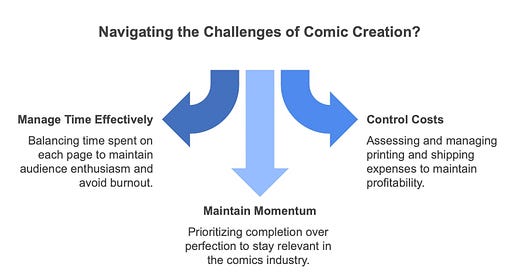♦♦♦[BIZ] Page Inflation Sinks Comics—But Sometimes It's Necessary
Bloated comics waste time and money. But sometimes, more pages enhance storytelling. Ask yourself: will chopping this story break your promise to readers?
Ever found yourself with a page count that's spiraling out of control? Yeah, me too. Let's talk about when that's a disaster waiting to happen—and when it might be precisely what your story needs.
Look, as comic creators, we've all been there. You start with a tight 22-page concept, and somehow you're staring at a 50+ page behemoth wondering, "How did this happen?" Without someone reining us in, our stories naturally expand. We convince ourselves that an extra scene is essential, that character moment is too good to cut, and before you know it...page inflation strikes again.
I've watched enough creators struggle with this to know the uncomfortable truth:
Sometimes, those extra pages kill your comic slowly and torturously. It deserves better, you deserve better.
Here's the reality check that it took me forever to internalize. But once I did, it was like a weight off my shoulders.
Bloated Page Counts Are Usually Bad News
The Time Trap
Every page you add means more than just additional drawing time—it's more revisions, more lettering, more coloring, more of everything. (Being an artist was never easy.) Meanwhile, your audience is wondering why your comic hasn't come out yet. Enthusiasm has an expiration date, trust me.
The Money Problem
Let's be honest about printing costs. They hurt. That 45-pager you're so proud of? It's going to cost more than a standard issue. How bad? Depends, but even if the printing costs aren't bad, your shipping costs might be. And either you eat that cost (goodbye, profit), or your readers do (goodbye, impulse buyers). It's a balancing act.
The Momentum Killer
While you're perfecting that epic first issue, other creators are putting out multiple comics, building their audience, getting feedback, and improving. I've seen many talented folks disappear into the void of producing their magnum opus while the comics world moves on without them. Perfecting their Opus? That's the death knell of it. Done is perfect. Done faster and shorter is even more perfect.
But Sometimes, You Need to Keep It Long
Here's a rare case where I disagree with myself. My most common warning is, "cut it, ruthlessly." A colleague recently shared their 57-page comic project—three standard issues in one package. My first suggestion was to cut it into three pieces. But after discussion, I agreed with him. Keeping that length made sense... this time. Rare, but it happens.
Making a Strong First Impression
If this is your first serious comic, sometimes you must reveal what makes your storytelling unique. The market is crowded—standing out requires courage and confidence. But when you do stand out, your focus and vision can set you apart.
The Promise Your Story Makes
In one lecture by Brandon Sanderson, he talks specifically about the "promise" of a story. Find his lectures on YouTube. He teaches a BYU course on writing fantasy and science fiction. They're excellent. None of that "fancy literature" claptrap.
I want readers who pick up my comic to love it. Do you want the same? Promise them a story, then deliver what you promised. That promise is an unwritten contract between you, the creator, and them, the readers. Take it seriously.
If your cover and opening pages suggest a mystery, that's what readers expect. If your story spontaneously turns into a knock 'em-down fight comic? Well, they ain't gonna like that. You've broken that promise. Good luck coaxing them back.
His longer comic shifts naturally from mystery into a bang-em-up. Makes sense when it comes in one issue. Because it's one cohesive package, it feels holistic and coherent. Continuity prevents it from being a nasty bait-and-switch between genres. Splitting this into three separate issues would damage the reader's experience. I get it. I agree. Keep it as one longer story.
Keep reading with a 7-day free trial
Subscribe to The Invisible Thread - Making Comics by Charles Houghton to keep reading this post and get 7 days of free access to the full post archives.





